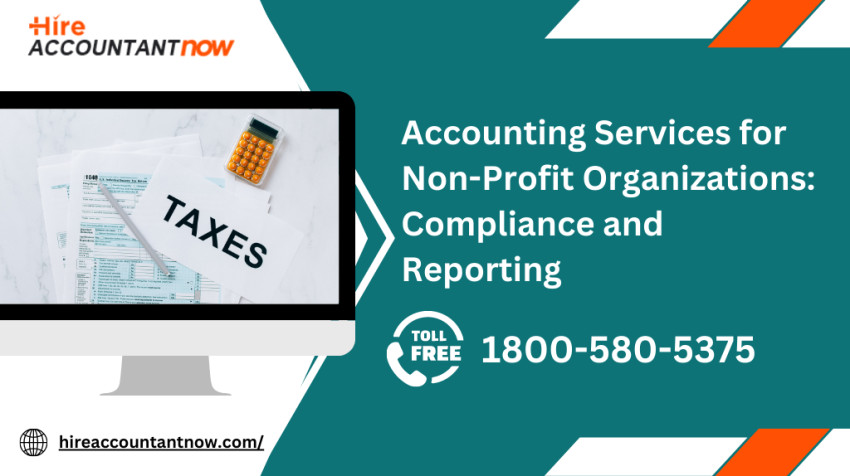
The cardinal aim of non-profits is to effect positive change in society and uplift localities through means such as addressing social issues. In order to report accurately on their finances, every organization, including non-profit entities, should maintain comprehensive monetary records. The importance of accounting services for non-profits will be explored in this article, as will the compliance and reporting demands they face.
For-profit businesses and non-profits operate in a different manner. Their primary objective is not just limited to earning profits but also includes serving social and charitable purposes. Nevertheless, it is necessary for them to meet their financial responsibilities while also following all legal and regulatory mandates. Non-profit organizations must have distinctive accounting services that fulfill their needs to secure financial transparency and accountability.
Importance of Accounting Services for Non-Profit Organizations
The scope of accounting services provided to non-profit organizations extends past mere number-crunching:
Financial Management
Managing the financial resources is made easier for organizations with assistance from non-profit accounting professionals. They offer precise and prompt financial reporting that enables well-informed decision-making as well as strategic planning.
Compliance
To maintain compliance with the law non-profits must strictly adhere to financial reporting standards and tax regulations. To steer clear of penalties and keep up a positive reputation for your company you need competent accounting services.
Transparency
Providing transparency about the financial health and operations of non-profit organizations is important for grantors along with other stakeholders. This can be achieved by creating reliable financial statements and enhancing transparency through implementing sound accounting principles.
Compliance Requirements for Non-Profit Organizations
To meet their obligations and demonstrate transparency in their operations, non-profit entities have to follow certain rules, including but not limited to meeting the finance report standard.
Financial Reporting Standards
To ensure consistency and compliance with local laws and regulations, non-profit groups often necessitate the use of either GAAP or FRS. Following these standards while recording and classifying financial transactions ensures comparison between different organizations.
Tax Regulations
Non-profits have a unique set of tax regulations separate from those of for-profit enterprises. It is possible for them to be eligible for tax-exempt status if they satisfy particular requirements and comply with all of the regulations set forth by the appropriate taxation officials.
Responsibilities of Non-Profit Accounting Professionals
The financial management responsibilities of organizations are expertly handled by non-profit accounting professionals. Included in their job description are:
Bookkeeping and financial recordkeeping
In non-profit finance management, precise and comprehensive bookkeeping is the foundation. Accounting professionals ensure that all transactions are accurately recorded while being compliant with accounting standards.
Budgeting and financial planning
It's common for non-profits to have limited resources and require judicious financial decision-making. Ensuring an organization's financial stability and longevity involves developing budgets as well as making sound resource allocation decisions.
Audit preparation and support
To make sure that their financial statements are accurate and reliable, non-profit organizations undergo yearly audits. Accounting professionals can help with audit preparations, such as gathering necessary documentation.
Special Considerations for Non-Profit Accounting
Non-profit and traditional business accounting differ in many ways, but one of the biggest is in their unique aspects:
Fund Accounting
The use of fund accounting is common among non-profit organizations for monitoring their financial resources and expenses according to funding sources or particular objectives. Restricted funds and grants require responsible management, which is demonstrated through the use of fund accounting by organizations.
Restricted Funds and Grants Management
It is common for non-profit organizations to receive grants and donations that have explicit conditions as to how the funds should be utilized. The responsibility for maintaining compliance with donor mandates while accurately managing restricted funds falls on accounting professionals.
Donor Contribution Tracking
Donor contribution monitoring and reporting need to be accurate in order for non-profits to succeed. The successful building of relationships between organizations and donors is facilitated by the implementation of efficient accounting systems that accurately record donations.
Reporting and transparency
Various types of reports that demonstrate transparency and accountability are required from non-profit organizations by stakeholders. Some essential requirements for reporting involve:
Annual Financial Statements
Producing annual comprehensive view reports is a must for non-profits, as a comprehensive set of financial reports usually contains three key items: a balance sheet or a statement of net assets; an income (or activity) report summarizing revenue and expenses over time; and a cash flow report detailing inflows and outflows during that same period, along with necessary notes to help explain each item.
IRS Form 990
The IRS requires non-profits operating in America to annually file a detailed document named Form 990, which provides a thorough account of an organization's finances, governance, and activities to evaluate their operation for both the public's benefit and regulatory purposes.
Benefits of Outsourcing Accounting Services
Opting for outsourced accounting services can offer several advantages to non-profit organizations:
Expertise
Focusing on non-profits allows accounting firms to provide an extensive range of skills and experience. They have expertise in identifying unique problems faced by non-profits and developing tailored solutions.
Cost-effectiveness
Rather than employing and instructing internal accountants, opting for outsourced bookkeeping services might be more cost-effective as overhead expenses. The requirement for additional equipment and space are eliminated.
Time-saving
Third-party services providing accounting services can aid non-profits in prioritizing their main goals while saving valuable resources. Managing the complex financial aspects is the job of professional accountants that lets organizational leaders direct their attention towards more important undertakings.
Challenges in Non-Profit Accounting
Managing finances for non-profits is not without its challenges:
Limited Resources
Operating on tight budgets non-profit organizations may face challenges in investing in robust accounting systems or employing dedicated accounting professionals.
Volunteer Management
It is a frequent occurrence for non-profit organizations to assign their accounting work to volunteers. Volunteers have value and their availability and varying skill sets pose challenges for consistent and accurate financial reporting.
Complex Reporting
Dealing with complex financial reporting in the non-profit sector necessitates a comprehensive understanding of specific accounting standards and regulations. Staying updated on the evolving reporting requirements may be a struggle for organizations.
Best Practices for Non-Profit Accounting
The implementation of these best practices can significantly aid in ensuring efficient and compliant accounting procedures for non-profit organizations:
A reliable record management system is needed by non-profit organizations to capture all the financial transactions accurately. Effective management of a non-profit organization's finances requires either the usage of specialized software's or hiring expert accountants.
Funds in non-profit organizations must be separated according to the organization's specific objectives or criteria. We ensure transparency which enables us to accurately report on our use of funds.
Preventing fraud and misuse of funds is vital for non-profits; therefore they should establish comprehensive internal control systems. To ensure proper management, it is important to have both segregation of duties as well as regular audits and strong financial oversight.
Keep yourself up-to-date
Reporting regulations and accounting standards applicable to nonprofits metamorphose as time progresses. Organizations are obliged to be informed of these changes and revise their processes accordingly in order to comply.
Conclusion
Maintaining accountability and financial clarity within non-profits is primarily achieved through utilizing accounting services. Non-profits can acquire shareholder and donor loyalty by working with accountants to manage funds and comply with financial reporting requirements. Cost-cutting and the possibility of accessing experts are some added benefits that come with outsourced accounting services. Additionally, adopting best practices and staying current help non-profits tackle the unique challenges of accounting while simultaneously maintaining financial stability.
FAQs
A non-profit organization's guide to ensuring compliance with financial reporting standards?
Compliance with the applicable set of generally accepted accounting principles or financial reporting standards specific to their location is necessary for non-profit organizations. Accounting professionals with a strong understanding of non-profit accounting and a commitment to staying informed about reporting requirements are vital.
Funds are critical for non-profit organizations, so what exactly is fund accounting and how does it help?
Funds are closely monitored by non-profit organizations using the fund accounting system in order to keep track of financial resources and expenses based on funding sources or specific objectives. The system encourages responsible use of funds while ensuring transparency in reporting to both investors and governing authorities.
Are non-profit organizations required to file tax returns?
Although they art is common for non-profits to submit tax returns. Specific requirements could vary depending on jurisdictional law or an organization's scale and practices.
How can outsourcing accounting services help non-profit organizations?
Cost savings and expertise are among the major advantages of outsourcing accounting services to specialized firms. Complex financial tasks combined with ensuring compliance can be taken care of by professional accounts. Enabling non-profit organizations to direct their energies towards achieving a common goal.




